It looks like you're using an Ad Blocker.
Please white-list or disable AboveTopSecret.com in your ad-blocking tool.
Thank you.
Some features of ATS will be disabled while you continue to use an ad-blocker.
11
share:
NOTE: I do not endorse or support any of these groups. Far from it. I think they were all deluded and dangerous criminals, and I condemn their
actions and ideologies. Nevertheless, as a phenomenon, the violent far left of this era has fascinating social, historical, political, and
psychological implications that are relevant in our own time, where issues of terrorism, domestic unrest, protest, and resistance (both violent and
peaceful) are once again in the spotlight.
The Militant Far Left the 60s and 70s
Violence at the Nightmare Edge of the Hippie Dream
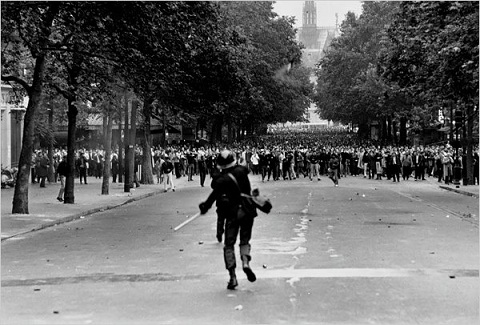
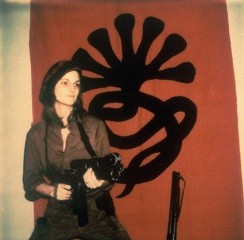
In the late 1960s and 70s, the original purity and idealism of the “flower children” youth movements in the developed world began to give way under the stresses and strains of what Hunter S. Thompson called “grim, meathook realities.” As the naivete of the Summer of Love curdled into something altogether darker, the militant left in its “hippie-freak” form began to take shape.
In this thread, we will look at some of the more prominent names of the militant left during this period. The thread will focus on the developed world, rather than on leftist guerilla movements in the developing world or radical phenomena like Mao’s Red Guard in China, for example.
In addition to a souring of the hippie dream, other factors were at play. There was frustration with the gap between ideals and reality and impatience with a perceived lack of progress on issues like Vietnam or racism. Some were seduced by romantic views of “revolution” and glorification of exotic figures like Che Guevera in Cuba. Others drifted farther and farther away from the values of general society through anti-establishment lifestyles and mindsets. For others, specific events like the massacre at Kent State or takeovers of university campuses had a galvanizing effect. As with any complex issue, the causes are multifaceted.
Info on the following specific groups is presented in the next two posts:
The Weather Underground - USA
The Baader-Meinhof Gang (Red Army Faction) – Germany
Symbionese Liberation Army - USA
Japanese Red Army - Japan
The Red Brigade- Italy

The Militant Far Left the 60s and 70s
Violence at the Nightmare Edge of the Hippie Dream


In the late 1960s and 70s, the original purity and idealism of the “flower children” youth movements in the developed world began to give way under the stresses and strains of what Hunter S. Thompson called “grim, meathook realities.” As the naivete of the Summer of Love curdled into something altogether darker, the militant left in its “hippie-freak” form began to take shape.
In this thread, we will look at some of the more prominent names of the militant left during this period. The thread will focus on the developed world, rather than on leftist guerilla movements in the developing world or radical phenomena like Mao’s Red Guard in China, for example.
In addition to a souring of the hippie dream, other factors were at play. There was frustration with the gap between ideals and reality and impatience with a perceived lack of progress on issues like Vietnam or racism. Some were seduced by romantic views of “revolution” and glorification of exotic figures like Che Guevera in Cuba. Others drifted farther and farther away from the values of general society through anti-establishment lifestyles and mindsets. For others, specific events like the massacre at Kent State or takeovers of university campuses had a galvanizing effect. As with any complex issue, the causes are multifaceted.
Info on the following specific groups is presented in the next two posts:
The Weather Underground - USA
The Baader-Meinhof Gang (Red Army Faction) – Germany
Symbionese Liberation Army - USA
Japanese Red Army - Japan
The Red Brigade- Italy

edit on 3/3/12 by silent thunder because: (no reason given)
The Weather Underground
AKA: The Weathermen, Weather Underground Organization, WUO
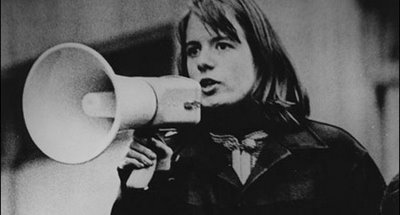
The Weather Underground had its roots in the SDS, a large student antiwar group with presences on college campuses nationwide. Taking their name from a Bob Dylan lyric (” You don't need a weatherman to know which way the wind blows”), the Weathermen were a militant splinter group of the SDS that wanted direct action and preached the violent overthrow of the U.S. government, with the goal of ending global imperialism. They also placed a great deal of emphasis on race and saw themselves as aligned with the Black Panthers and other minority groups. The group sponsored a number of violent events from 1969 until the late 1970s, although some individual members continued violent activity until 1987.
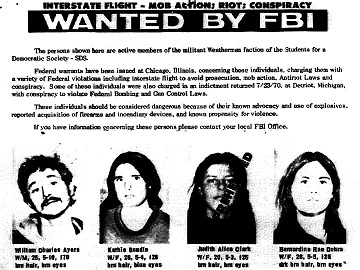
Activities
The Weather Underground carried out a large number of bombings, usually declared as revenge for specific incidents. They tried to destroy property and not human life, hitting their targets late at night after phoning in threats. Weathermen bombing sites include the following: The US Capitol Building, the Pentagon, The National Guard Building, Bank of America, Golden Gate Park, the Harvard University Center for International Affairs, the MIT Research Center, and many others. They were also responsible for the “Days of Rage” riots in 1969 and for helping Timothy Leary to escape from prison.

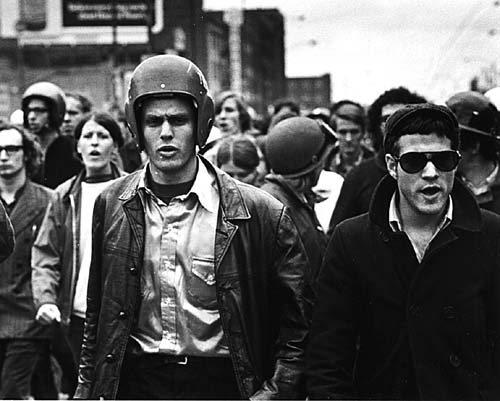
The Baader-Meinhof Gang
AKA: The Red Army Faction, Die Rote Armee Fraktion, RAF

Founded in 1970 by Andreas Baader, Gudrun Ensslin, Horst Mahler, and Ulrike Meinhof, and technically operative until 1998, its heyday was the 1970s, particularly 1977, when the frequency and severity of its attacks threatened to paralyze Germany. Dedicated to overthrow of imperialism and global Communism, the RAF was upset at Germany’s support for US involvement in Vietnam. They also noted that many of Germany’s postwar political and industrial leaders had Nazi pasts, and believed the country had been insufficiently de-Nazified after the end of the Second World War.
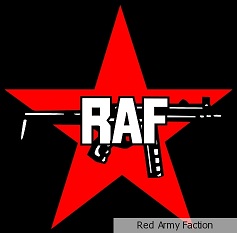
Activities
The RAF conducted a number of bombings, with targets that included US military barracks and headquarters, various police stations, and cars and offices of figures such as judges and others. The group also assassinated a number of officials (often in revenge for the death or imprisonment of their own), and participated in deadly police shootouts. Other notable crimes include the Frankfurt department store arsons of 1968 and the hijacking of Lufthansa Flight 181.
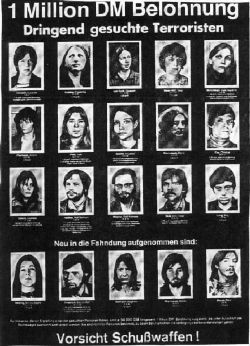
AKA: The Weathermen, Weather Underground Organization, WUO

The Weather Underground had its roots in the SDS, a large student antiwar group with presences on college campuses nationwide. Taking their name from a Bob Dylan lyric (” You don't need a weatherman to know which way the wind blows”), the Weathermen were a militant splinter group of the SDS that wanted direct action and preached the violent overthrow of the U.S. government, with the goal of ending global imperialism. They also placed a great deal of emphasis on race and saw themselves as aligned with the Black Panthers and other minority groups. The group sponsored a number of violent events from 1969 until the late 1970s, although some individual members continued violent activity until 1987.

Activities
The Weather Underground carried out a large number of bombings, usually declared as revenge for specific incidents. They tried to destroy property and not human life, hitting their targets late at night after phoning in threats. Weathermen bombing sites include the following: The US Capitol Building, the Pentagon, The National Guard Building, Bank of America, Golden Gate Park, the Harvard University Center for International Affairs, the MIT Research Center, and many others. They were also responsible for the “Days of Rage” riots in 1969 and for helping Timothy Leary to escape from prison.


The Baader-Meinhof Gang
AKA: The Red Army Faction, Die Rote Armee Fraktion, RAF

Founded in 1970 by Andreas Baader, Gudrun Ensslin, Horst Mahler, and Ulrike Meinhof, and technically operative until 1998, its heyday was the 1970s, particularly 1977, when the frequency and severity of its attacks threatened to paralyze Germany. Dedicated to overthrow of imperialism and global Communism, the RAF was upset at Germany’s support for US involvement in Vietnam. They also noted that many of Germany’s postwar political and industrial leaders had Nazi pasts, and believed the country had been insufficiently de-Nazified after the end of the Second World War.

Activities
The RAF conducted a number of bombings, with targets that included US military barracks and headquarters, various police stations, and cars and offices of figures such as judges and others. The group also assassinated a number of officials (often in revenge for the death or imprisonment of their own), and participated in deadly police shootouts. Other notable crimes include the Frankfurt department store arsons of 1968 and the hijacking of Lufthansa Flight 181.

edit on 3/3/12 by silent thunder because: (no reason given)
The Symbionese Liberation Army
AKA: The SLA


This small group of self-styled “urban guerillas” achieved national prominence with the 1974 kidnapping of Patricia Hearst, daughter of media giant Randolph Hearst. The group’s leader, Donald DeFreeze, wrote, "The name 'symbionese' is taken from the word 'symbiosis' and we define its meaning as a body of dissimilar bodies and organisms living in deep and loving harmony and partnership in the best interest of all within the body.” It is perhaps worth noting that this was (as far as I can tell) the only major example of a truly interracial radical movement during these years. Most members were killed in a fire following a lengthy shootout with the Los Angeles police that was one of the first such events ever to be broadcast live on television.

Activities
In addition to the Hearst kidnapping, the SLA assassinated school superintendent Marcus Foster and robbed multiple banks. Its most famous episode was the kidnapping, however. Initially the SLA wanted to trade 19-year-old Patty Hearst for 2 SLA members who were in prison. When this proved impossible to negotiate, they bargained to have Hearst set up a 2-million-dollar program to distribute food free to the poor in California for several weeks. However, Patty Hearst decided to stay with the group after being freed, claiming she was joining of her own free will. Later she claimed she had been brainwashed, sexually abused, and was a victim of Stockholm Syndrome, the psychological tendency of a hostage to identify with and even support the kidnapper. Hearst’s case was controversial: Was she a brainwashed victim, or should she be held accountable for her own actions, which included bank robbery?
Japanese Red Army
AKA: 日本赤軍 Nihon Sekigun, JRA


(Herein, I use the term “Red Army” as a blanket term for both the “official” JRA and the complex tangle of related Japanese groups, such as the Red Army Faction, the United Red Army, etc.)
The Japanese Red Army was active in the 1970s and 1980s, with the stated goals of overthrowing the Imperial family in Japan and working to further global Communist revolution. They were responsible for a number of violent incidents both in Japan and abroad, such as bombings, hijackings, and airport terrorism.

Activities
The Red Army achieved global notoriety with several airport actions. In 1971 the group hijacked Japan Airlines Flight 351 and took it to North Korea. In 1972 it perpetrated the Lod Airport Massacre, killing 26 and wounding 80 in an assault-rifle-and-grenade attack on Lod Airport in Israel. Another notable incident was the killing of 12 members by the group at a training camp in Mount Haruna in 1971, which was followed by a weeklong police siege. The Red Army was also responsible for other forms of mayhem, including numerous bombings in Japan, kidnappings, and hostage incidents.

The Red Brigade
AKA: Brigate Rosse, BR
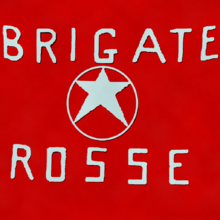
This Italian Marxist organization sought to achieve a “revolutionary state” and, in particular, to remove Italy from NATO and the US sphere of influence. In addition to various acts of violence carried out during the so-called “years of lead,” the group is best known for kidnapping and murder of former Italian Prime Minister Aldo Moro in 1978.
Activities
Red brigade acts include factory sabotage, kidnapping, bank robberies, and trafficking in arms & narcotics. In 1978, a Red Brigade team headed by Mario Moretti kidnapped former Prime Minister Aldo Moro, who was then a key figure in negotiations seeking an “historic compromise” with Italian Communists. After holding their captive for 45 days, the Red Brigade murdered him.

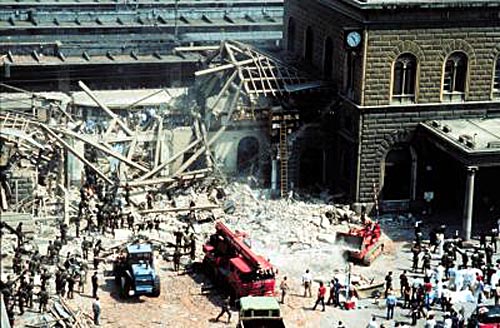
Finis
AKA: The SLA


This small group of self-styled “urban guerillas” achieved national prominence with the 1974 kidnapping of Patricia Hearst, daughter of media giant Randolph Hearst. The group’s leader, Donald DeFreeze, wrote, "The name 'symbionese' is taken from the word 'symbiosis' and we define its meaning as a body of dissimilar bodies and organisms living in deep and loving harmony and partnership in the best interest of all within the body.” It is perhaps worth noting that this was (as far as I can tell) the only major example of a truly interracial radical movement during these years. Most members were killed in a fire following a lengthy shootout with the Los Angeles police that was one of the first such events ever to be broadcast live on television.

Activities
In addition to the Hearst kidnapping, the SLA assassinated school superintendent Marcus Foster and robbed multiple banks. Its most famous episode was the kidnapping, however. Initially the SLA wanted to trade 19-year-old Patty Hearst for 2 SLA members who were in prison. When this proved impossible to negotiate, they bargained to have Hearst set up a 2-million-dollar program to distribute food free to the poor in California for several weeks. However, Patty Hearst decided to stay with the group after being freed, claiming she was joining of her own free will. Later she claimed she had been brainwashed, sexually abused, and was a victim of Stockholm Syndrome, the psychological tendency of a hostage to identify with and even support the kidnapper. Hearst’s case was controversial: Was she a brainwashed victim, or should she be held accountable for her own actions, which included bank robbery?
Japanese Red Army
AKA: 日本赤軍 Nihon Sekigun, JRA


(Herein, I use the term “Red Army” as a blanket term for both the “official” JRA and the complex tangle of related Japanese groups, such as the Red Army Faction, the United Red Army, etc.)
The Japanese Red Army was active in the 1970s and 1980s, with the stated goals of overthrowing the Imperial family in Japan and working to further global Communist revolution. They were responsible for a number of violent incidents both in Japan and abroad, such as bombings, hijackings, and airport terrorism.

Activities
The Red Army achieved global notoriety with several airport actions. In 1971 the group hijacked Japan Airlines Flight 351 and took it to North Korea. In 1972 it perpetrated the Lod Airport Massacre, killing 26 and wounding 80 in an assault-rifle-and-grenade attack on Lod Airport in Israel. Another notable incident was the killing of 12 members by the group at a training camp in Mount Haruna in 1971, which was followed by a weeklong police siege. The Red Army was also responsible for other forms of mayhem, including numerous bombings in Japan, kidnappings, and hostage incidents.

The Red Brigade
AKA: Brigate Rosse, BR

This Italian Marxist organization sought to achieve a “revolutionary state” and, in particular, to remove Italy from NATO and the US sphere of influence. In addition to various acts of violence carried out during the so-called “years of lead,” the group is best known for kidnapping and murder of former Italian Prime Minister Aldo Moro in 1978.
Activities
Red brigade acts include factory sabotage, kidnapping, bank robberies, and trafficking in arms & narcotics. In 1978, a Red Brigade team headed by Mario Moretti kidnapped former Prime Minister Aldo Moro, who was then a key figure in negotiations seeking an “historic compromise” with Italian Communists. After holding their captive for 45 days, the Red Brigade murdered him.


Finis
edit on 3/3/12 by silent thunder because: (no reason given)
The Sad thing is that these Radical Hippies have now turned into the Corporate Suits, advocating Greed and Growth, and forgotten the "Times they are
a changing".....Well, the ones that didnt get stuck on wacked out woopy weed and drugs, that is.
When the Beatles sang "All you need is Love" in 1967, they were already millionaires.
Notice its only the Rich people who say, "Money Doesnt buy Happiness"....
But it sure does buy a lot of things that make you happy....like food and shelter, among others, and a Ferrari or two or three....
When the Beatles sang "All you need is Love" in 1967, they were already millionaires.
Notice its only the Rich people who say, "Money Doesnt buy Happiness"....
But it sure does buy a lot of things that make you happy....like food and shelter, among others, and a Ferrari or two or three....
Fascinating stuff there! Star and flag for you. It's going to take me a while to look through all of it. Most of this occurred before my time, or
when I was too little to know or care. I knew about Patty Hearst, but I hadn't even heard of some of these other groups. I learned something
tonight. Thanks!
This is interesting because we usually hear about domestic extremism in the context of far right groups and militias these days. You almost never hear
about far-left violent extremists anymore. It's like this entire form of thought has vanished. Very interesting.
Also, looking at the images and video clips above, I'm surpised how many women were involved in this stuff. I tend to think of extremists or terrorists as almost exclusively male; this scene was permiated by many women who didn't hesitate to use violence any more than the men did.
Also, looking at the images and video clips above, I'm surpised how many women were involved in this stuff. I tend to think of extremists or terrorists as almost exclusively male; this scene was permiated by many women who didn't hesitate to use violence any more than the men did.
edit on 3/4/2012 by FailedProphet because: (no reason given)
Originally posted by FailedProphet
Also, looking at the images and video clips above, I'm surpised how many women were involved in this stuff. I tend to think of extremists or terrorists as almost exclusively male; this scene was permiated by many women who didn't hesitate to use violence any more than the men did.
Yes, that's a good point. In the post 9-11 world we are used to thinking of terrorism as perpetrated by "lonely single males" but these groups show a very different dynamic, with the involvement of males and females alike. Presumably the ideology is at play: more women are generally drawn to the left than the right, although important exceptions abound. A lot of these groups were "anti-monogamy," too, or had non-conventional assumptions about relationships between the sexes.
reply to post by silent thunder
It is the weatherman group that Obama has been shown to have ties with. Apparently it was an issue brought up in the 2008 election. It is an issue that Breitbart was about to expose. I know that there is some discussion as to how credible wikipedia is here on ats. However a look at that site gives the picture as to how dangerous this group was. All those people didn't just disappear they simply changed tactics. As has been said many have put on business suits and taken over the corporate world. However clothes and appearance doesn't make a person or change a person..
It is the weatherman group that Obama has been shown to have ties with. Apparently it was an issue brought up in the 2008 election. It is an issue that Breitbart was about to expose. I know that there is some discussion as to how credible wikipedia is here on ats. However a look at that site gives the picture as to how dangerous this group was. All those people didn't just disappear they simply changed tactics. As has been said many have put on business suits and taken over the corporate world. However clothes and appearance doesn't make a person or change a person..
reply to post by redrose123
Looking at the video in the second post, some of the ex-Weathermen appear to have more or less "normal" lives now. One is a bartender, one is a community college teacher, for example. I assume they have all been to prision and "rehabilitated," but I would be very interested to know if any of them went on to more influential or political positions. There doesn't seem to be much info on this on the net, surprise surprise...A "where are they now" look at some of these characters would be most enlightening, I feel sure.
Although its not my intention to turn this into an Obama-bashing thread or to tar all leftists with the brush of these extremists, I do wonder to what extent (if any) these people continue to have political or ideolgical influence.
Looking at the video in the second post, some of the ex-Weathermen appear to have more or less "normal" lives now. One is a bartender, one is a community college teacher, for example. I assume they have all been to prision and "rehabilitated," but I would be very interested to know if any of them went on to more influential or political positions. There doesn't seem to be much info on this on the net, surprise surprise...A "where are they now" look at some of these characters would be most enlightening, I feel sure.
Although its not my intention to turn this into an Obama-bashing thread or to tar all leftists with the brush of these extremists, I do wonder to what extent (if any) these people continue to have political or ideolgical influence.
All these so-called groups have something in common. Who created them ,who backed them and who furthered their cause.
Same people, same plot, same outcome.
Its a global conspiracy and this group is playing all sides in the equation.
Same people, same plot, same outcome.
Its a global conspiracy and this group is playing all sides in the equation.
The Militant Far Left Bookshelf
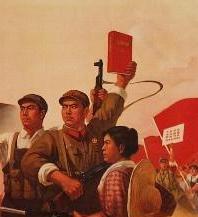
I originally started this thread more or less for a friend who seems to be engaged in something else at the moment. Nevertheless, topics about the radical far left seems to have gained some traction on ATS in recent days, so in the interest of keeping this thread going, I’ll toss out another post, this time on some popular volumes that might have been found on the bookshelf of yesterday’s far left revolutionary. Remember that in the old, pre-widespread-internet days, books played a huge role in helping people to define themselves and creating communities of intellect based on the shared consumption of certain ideas.
Without further ado, then, below are a few of the tomes that one would be likely to find on the shelf of any self-respecting street revolutionary back in the day. Not all of these books are “revolutionary,” and there are similar examples I’ve probably missed (I decided to leave Steal this Book by Abbie Hoffman off, for examle, although I could easily have included it, or other similar works). But the short list below provides a look at what these urban guerillas were feeding their head.
The Minimanual of the Urban Guerilla by Carlos Marighella
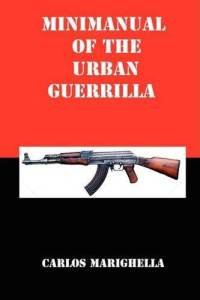
This short, almost mystically vague manual of urban street revolution was written by a Brazillian seeking to overthrow his government. Ultimately more inspirational than tactical, it proved to be a big favorite with the armed leftists of the developed world, perhaps as much for how it made revolutionaries feel about themselves as anything else.
Guerilla Warfare by Che Guevara

Another short, accessible manual much beloved by the militant left. Feeling themselves outnumbered and outgunned in facing the state, groups like the Baader-Meinhof Gang or the Weathermen sought to apply a strategy lifted from Che and other third-world vanguardists of focusing on urban guerilla operations and asymmetrical warfare.
Rules for Radicals by Saul Alinsky
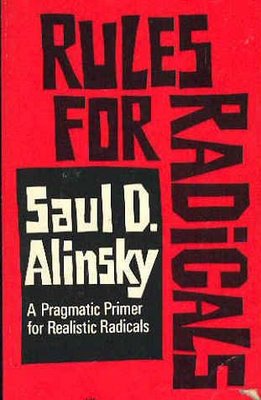
This is less about violent confrontation and more about street-level organization for change. It was read and loved by many violent and non-violent radicals alike, and many have pointed to it as an influence on the current administration in the White House. Be that as it may, the book has been influential in radical leftist circles since the days of turmoil this thread covers.
The Anarchist Cookbook by William Powell
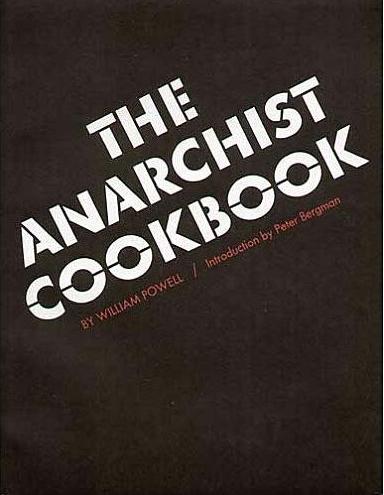
Still a favorite with teenage boys everywhere looking to blow things up, this underground classic has long provided the nuts and bolts of dangerous (often illegal) street-rumble techniques and weaponry, among other general dirty tricks.
Quotations from Chairman Mao

Perhaps one of the most popular books ever written, at one time going outside without a copy of Mao’s “little red book” could get you shipped off to the collectives for punishment in China. In the west, it was never embraced with such fervor, but among new-left radicals, this small volume was both a fashion statement and a source of ideological inspiration, with its pithy quotes and short passages on numerous topics of interest to hard-leftists.
Soledad Brother by George Jackson
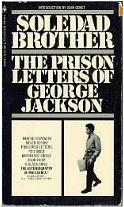
This book is a good example of the “Black Power memoir” genre that proved enormously popular with the radical left. Whether it was this book (detailing the imprisonment and thoughts of later-to-be-killed-by-the-authorities Black Panther leader), the Autobiography of Malcolm X, or Soul on Ice by Eldridge Cleaver, the gritty real-life memories and tales of resistance in books of this sort was an influence on groups like the Weathermen, as well as countless radical individuals.
Pedoagogy of the Oppressed by Paulo Freire

This book about teaching the oppressed in third-world scenarios or poverty zones within the developed world was very popular among radicals who entered into the educational system and began to transform it in the 60s and 70s. Although not a work of violence, it was important for many who dwelt on the outer edges of leftist radicalism and then re-entered the intellectual mainstream through the ivory tower.
One-Dimensional Man by Herbert Marcuse
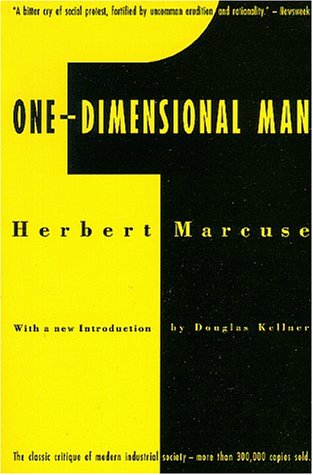
This provided the philosophical framework for much of radical/violent "new-new left" thought. A very influential work by a member of the "Continental School" of radical French semioticians, this book showed how society allegedly represses people culturally and mentally in a way that can be thought of as violence or oppression. Learning to see "normlacy" as repressive was a key part of the justification the radicals used for their attacks in many cases...as well as the non-violent intellectual attacks on mainline culture by academic radicals in the decades since the 60s. Marcuse's work was infulential for philosophically/semiotically-inclined members of both leftist circles.

I originally started this thread more or less for a friend who seems to be engaged in something else at the moment. Nevertheless, topics about the radical far left seems to have gained some traction on ATS in recent days, so in the interest of keeping this thread going, I’ll toss out another post, this time on some popular volumes that might have been found on the bookshelf of yesterday’s far left revolutionary. Remember that in the old, pre-widespread-internet days, books played a huge role in helping people to define themselves and creating communities of intellect based on the shared consumption of certain ideas.
Without further ado, then, below are a few of the tomes that one would be likely to find on the shelf of any self-respecting street revolutionary back in the day. Not all of these books are “revolutionary,” and there are similar examples I’ve probably missed (I decided to leave Steal this Book by Abbie Hoffman off, for examle, although I could easily have included it, or other similar works). But the short list below provides a look at what these urban guerillas were feeding their head.
The Minimanual of the Urban Guerilla by Carlos Marighella

This short, almost mystically vague manual of urban street revolution was written by a Brazillian seeking to overthrow his government. Ultimately more inspirational than tactical, it proved to be a big favorite with the armed leftists of the developed world, perhaps as much for how it made revolutionaries feel about themselves as anything else.
Guerilla Warfare by Che Guevara

Another short, accessible manual much beloved by the militant left. Feeling themselves outnumbered and outgunned in facing the state, groups like the Baader-Meinhof Gang or the Weathermen sought to apply a strategy lifted from Che and other third-world vanguardists of focusing on urban guerilla operations and asymmetrical warfare.
Rules for Radicals by Saul Alinsky

This is less about violent confrontation and more about street-level organization for change. It was read and loved by many violent and non-violent radicals alike, and many have pointed to it as an influence on the current administration in the White House. Be that as it may, the book has been influential in radical leftist circles since the days of turmoil this thread covers.
The Anarchist Cookbook by William Powell

Still a favorite with teenage boys everywhere looking to blow things up, this underground classic has long provided the nuts and bolts of dangerous (often illegal) street-rumble techniques and weaponry, among other general dirty tricks.
Quotations from Chairman Mao

Perhaps one of the most popular books ever written, at one time going outside without a copy of Mao’s “little red book” could get you shipped off to the collectives for punishment in China. In the west, it was never embraced with such fervor, but among new-left radicals, this small volume was both a fashion statement and a source of ideological inspiration, with its pithy quotes and short passages on numerous topics of interest to hard-leftists.
Soledad Brother by George Jackson

This book is a good example of the “Black Power memoir” genre that proved enormously popular with the radical left. Whether it was this book (detailing the imprisonment and thoughts of later-to-be-killed-by-the-authorities Black Panther leader), the Autobiography of Malcolm X, or Soul on Ice by Eldridge Cleaver, the gritty real-life memories and tales of resistance in books of this sort was an influence on groups like the Weathermen, as well as countless radical individuals.
Pedoagogy of the Oppressed by Paulo Freire

This book about teaching the oppressed in third-world scenarios or poverty zones within the developed world was very popular among radicals who entered into the educational system and began to transform it in the 60s and 70s. Although not a work of violence, it was important for many who dwelt on the outer edges of leftist radicalism and then re-entered the intellectual mainstream through the ivory tower.
One-Dimensional Man by Herbert Marcuse

This provided the philosophical framework for much of radical/violent "new-new left" thought. A very influential work by a member of the "Continental School" of radical French semioticians, this book showed how society allegedly represses people culturally and mentally in a way that can be thought of as violence or oppression. Learning to see "normlacy" as repressive was a key part of the justification the radicals used for their attacks in many cases...as well as the non-violent intellectual attacks on mainline culture by academic radicals in the decades since the 60s. Marcuse's work was infulential for philosophically/semiotically-inclined members of both leftist circles.
edit on 3/21/12 by silent thunder because: (no reason given)
Originally posted by farahpervez01
you have provided us such nice information here
Thanks, I'm glad its of interest to people. Makes me feel I'm not wasting my time.
This is pretty much an attempt to organize these ideas in my own head, and to understand them as an ideological outsider.
The group I find myself most interested in is the Baader-Meinhof group, the German RAF. They seem to have been the most ruthless, effective, and destructive (to themselves and others) of these groups. The movie that is referenced in the clip on the RAF (second post in this thread) really is very good as far as such things go. OF course as a fictional adaptation it has limits, but good info on this group seems remarkably limited, given their reach and import in the 1970s. If those interested get a chance, I recommend the movie. Even if you can't speak German, just watch the trailer clip in the second post, it gives a good sense of the kinds of things the RAF was up to. A rather chilling group of people, and a vision that was quite enduring and long-lasting, too.
edit on 3/21/12 by silent thunder because: (no reason given)
Originally posted by gort51
The Sad thing is that these Radical Hippies have now turned into the Corporate Suits, advocating Greed and Growth, and forgotten the "Times they are a changing".....Well, the ones that didnt get stuck on wacked out woopy weed and drugs, that is.
When the Beatles sang "All you need is Love" in 1967, they were already millionaires.
Notice its only the Rich people who say, "Money Doesnt buy Happiness"....
But it sure does buy a lot of things that make you happy....like food and shelter, among others, and a Ferrari or two or three....
But those whacked out wooly weed are the ones that influenced their belief system. Many of the ideologies formed their new religions.
Babylon is the end time religious and commercial system and Revelation 18 states something very interesting:
"Your merchants were the world’s great men.
By your magic spell all the nations were led astray."
"magic spell" -Greek word pharmakeia refers to drugs and sorcery, which would usually involve meditations and incantations.
The basis of every "New Age" thought or belief always goes back to the 50s/60s shamans, gurus and yogis. Those who pushed the psychedelic drugs of the counterculture said: this will bring spiritual enlightenment, resulting in peace for the world, and the bettering of relationships. They lied. They were deceived. A new state of mind was born that went far beyond the hippies, for the drugs of that time were taken and experienced by so many - military intelligence services, politicians, academics, artists, psychiatrists,the medical and therapeutic professions, as well as teachers, lawyers and others. The ultimate message derived from these drugs was that truth resides within man and not outside; there is no external God. And more - that one is a god.
And the Bible states that "pharmakeia" leads all the nations astray, it deceives them. From God's perspective, it means away from Him and His Truth. What we have today are leaders who suscribe to these beliefs derived from the 50s/60s. We have many average folk experimenting with '___', astral traveling, psychedlics .. All coming into contact with spiritual entities.
And if you then realise that the Hippocratic oath is to Apollo and that the current medical insignia is of Caduceus, the staff of Hermes, which replaced the cross in 1902, then we have our tie directly into the fallen angels who are actively deceiving the end time generations.
Silent... I would be interested to know how old you are. Point being that although you makie a very good point with your thread, there are always
extreme people in any "movement", even churches, however,there certainly was a lot more of the OTHER side to it as well. I know because I lived
through it, and was a part of that other side. But maybe that's an opposing thought fro another thread.
Originally posted by Nana2
Silent... I would be interested to know how old you are. Point being that although you makie a very good point with your thread, there are always extreme people in any "movement", even churches, however,there certainly was a lot more of the OTHER side to it as well. I know because I lived through it, and was a part of that other side. But maybe that's an opposing thought fro another thread.
My intention with this thread is not to smear the left or to use this topic as some kind of ideological cudgel. I don't do that sort of thing, it bores me. I'm simply honestly interested in this phenomena for its own sake. I spent some time dealing with groups that could be called armed right-wing groups in the 1990s in Central Asia, ex-USSR, some Southeast Asia, mostly. But I have no experience with leftist extremists of this sort; moreover, it seems to have died out (for now), although there are hints this kind of extremism may return; all things go in cycles. Anyway, I don't do the left-right punch-judy show, it bores me like I said. Of course the bulk of "the Movement" in the 60s was nonviolent but as you yourself seem to have discerned, its not the topic of this thread. This is about armed urban combat groups with leftist organizing principles, of various degrees of rigor. No offence ment to others of any other ideological persuasion.
Still would like to know your age group , because your post is well researched, well stated. I find that unusal these days in people of a "younger"
persuasion.
reply to post by silent thunder
Was it not revealed that the SLA was, in the end, some sort of U.S. alphabet agency creation?
Was it not revealed that the SLA was, in the end, some sort of U.S. alphabet agency creation?
reply to post by Nana2
Thanks for the complement. I'm in my early 40s. Don't know how much of a "younger" person that makes me...its too young to remember these groups firsthand I suppose.
reply to post by JohnnyCanuck
I haven't heard that one. Most of them died in a shootout against the gov't, so not sure how that would work...any links?
Thanks for the complement. I'm in my early 40s. Don't know how much of a "younger" person that makes me...its too young to remember these groups firsthand I suppose.
reply to post by JohnnyCanuck
I haven't heard that one. Most of them died in a shootout against the gov't, so not sure how that would work...any links?
new topics
-
Carry On!
Short Stories: 8 minutes ago -
This should be plastered all over the airwaves
Mainstream News: 5 hours ago -
Oh, Good Gosh. “Kremlin Warns Stay Away from Greenland.”
World War Three: 7 hours ago -
Archbisop Vigano Warns of Deep State and Deep Church
New World Order: 7 hours ago
top topics
-
This should be plastered all over the airwaves
Mainstream News: 5 hours ago, 18 flags -
Archbisop Vigano Warns of Deep State and Deep Church
New World Order: 7 hours ago, 11 flags -
Oh, Good Gosh. “Kremlin Warns Stay Away from Greenland.”
World War Three: 7 hours ago, 11 flags -
Fire insurance in LA withdrawn months ago
General Conspiracies: 16 hours ago, 9 flags -
A Flash of Beauty: Bigfoot Revealed ( documentary )
Cryptozoology: 13 hours ago, 7 flags -
Carry On!
Short Stories: 8 minutes ago, 0 flags
active topics
-
Judge rules president-elect Donald Trump must be sentenced in 'hush money' trial
US Political Madness • 107 • : matafuchs -
This should be plastered all over the airwaves
Mainstream News • 36 • : Dalamax -
Candidate TRUMP Now Has Crazy Judge JUAN MERCHAN After Him - The Stormy Daniels Hush-Money Case.
Political Conspiracies • 2184 • : marg6043 -
Trump says ownership of Greenland 'is an absolute necessity'
Other Current Events • 150 • : Lazy88 -
Los Angeles brush fires latest: 2 blazes threaten structures, prompt evacuations
Mainstream News • 335 • : Vermilion -
Carry On!
Short Stories • 0 • : randomuser2034 -
Oh, Good Gosh. “Kremlin Warns Stay Away from Greenland.”
World War Three • 27 • : Lazy88 -
To become president, Zelensky had to learn Ukrainian
Political Conspiracies • 40 • : BedevereTheWise -
Labour Plotting to Postpone May's Council Elections ?
Regional Politics • 22 • : gortex -
Fire insurance in LA withdrawn months ago
General Conspiracies • 36 • : xuenchen
11
